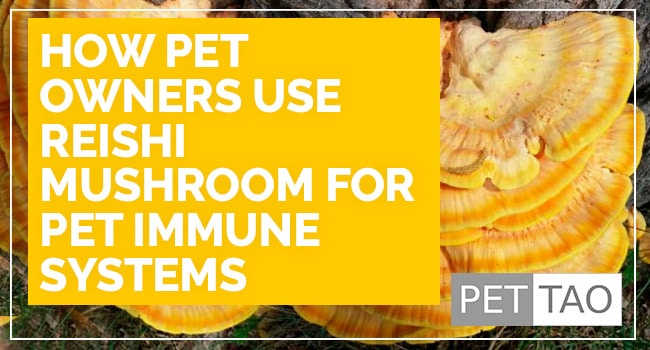Will Reishi Mushrooms Help Your Pet?
If your pet has a weak immune system, Reiki mushrooms are a wonderful tool.
Pets with weakened immune systems can face a myriad of health problems.
Pets experience weakened immune systems for a variety of reasons such as cancer, infection or inflammation.
Traditional veterinarians will recommend Western remedies to treat immunodeficiencies.
However, pharmaceuticals often have strong side effects.
A veterinarian practicing Traditional Chinese Veterinary Medicine (TCVM) may recommend alternative options to strong pharmaceuticals, such as Eastern and Western herbs or supplements.
If your pet has a compromised immune system, he or she may benefit from a mushroom-based supplement.
An increasing number of pet parents see excellent results by administering a supplement with Reishi mushroom for pet immune systems.
What Is Reishi Mushroom?
Reishi is also known by its botanical name Ganoderma lucidum or the Chinese name Ling zhi.
In addition to immune support, Reishi has other proven health benefits including liver and kidney boosting, antioxidant, anti-inflammatory, allergy relieving, blood pressure regulating and blood sugar controlling properties.
Reishi mushroom’s benefits stem from four main ingredients: triterpenes, β-glucans, the Ling-Zhi-8 protein, and antioxidants.
Triterpenes
Reishi produces high levels of a specific class of triterpene known as the ganoderic acids.
Research shows ganoderic acids inhibit the growth of osteosarcomas, lymphomas, and meningiomas.
Ganoderic acids also slow metastasis of cancer, increasing life expectancy.
β-glucans
Β-glucans are water-soluble polysaccharides.
How do they work?
Β-glucans dull the immune response to immune-modulating cells in the body called toll-like receptors (TLRs).
This reduces inflammation and protects the gut during chemotherapy.
Ling-Zhi-8 Protein
The Ling-Zhi-8 Protein suppresses the immune response in key cells, reducing oxidative stress, scarring, and propagation of disease.
Antioxidants
The antioxidants in Reishi mushrooms include Zinc, Vitamin C, and Selenium.
These antioxidants fight free radicals, the molecules increased during oxidative stress damaging surrounding healthy cells.
Why Is Reishi Mushroom Beneficial for Improving Pet Immunity?
In Eastern medicine, Reishi mushrooms are known as a “three treasure” herb.
Reishi harmonizes Jing (life force), qi (energy), and Shen (spirit).
In fact, scientific documents from as far back as the Chinese Han Dynasty (206 B.C. to 8 A.D.) classify Reishi as “Superior,” the highest designation for medicine.
Reishi mushroom contains multiple bioactive polysaccharides (carbohydrate chemical units) and triterpenoids (soap-like plant-based compounds).
Studies in animals show Reishi’s effects in boosting the immune system, reducing the blood supply to cancer cells and having a low negative impact on pets.
Research suggests the polysaccharides in Reishi mushroom demonstrate anti-tumor and immunostimulating activity.
Reishi can also help prevent secondary cancers.
Studies show reishi reduces the side effects of chemotherapy or radiation treatment, making it an excellent supplement for pets undergoing cancer treatment.
Additionally, the Japanese government officially lists Reishi as an adjunct herb for cancer.
Does Reishi Mushroom Have Side Effects?
Reishi mushroom is known for its gentle efficacy.
High doses of Reishi might slow blood clotting. Safety has not been proven in pregnant or lactating animals.
How to Use Reishi Mushroom with Other Herbs and Compounds
Reishi’s benefits are best when combined with other compounds.
For example, a supplement including Reishi, Shiitake, Turkey Tail, and Maitake mushrooms would most effectively help your pup.
Seeking an all natural supplement to boost your dog’s immune system?








